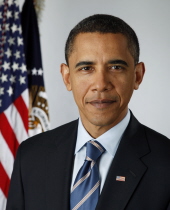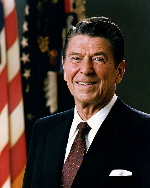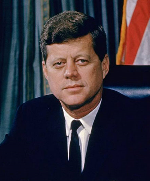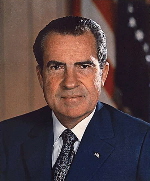Face the Nation: Obama Lags Behind Modern Presidents in Delivering Addresses to the American People
Obama waited longer than any president since Truman before delivering first address from the White House; Democratic presidents since Truman have historically shied away from direct addresses to the nation during first 500 days

But the address was also noteworthy for being the President’s first address to the nation from the White House, as well as his first such ‘one-on-one’ address directly to the American people from any location since taking office 513 days prior.
While the mass public is undoubtedly part of the targeted audience of a president’s Inaugural and State of the Union addresses, modern presidents in the television age have frequently used the White House as a backdrop to speak directly, uninterrupted, to their countrymen and women, particularly in times of war, economic crisis, or major policy change.
But not President Obama.
A Smart Politics analysis of presidential speeches finds that Obama waited longer than any other President dating back to Harry Truman to deliver a major address from the White House to speak directly to the American people, and thus has given the fewest such addresses during the first 513 days of his presidency.
Observers of Obama’s media skills have long praised the President for his ability to be engaging and deliver rousing (scripted) speeches before crowds of hundreds of people, but that he has struggled with his presentation with more unscripted, intimate formats, such as news conferences (e.g. his last prime time news conference on July 22, 2009).
And while formal addresses to the nation from the White House are scripted, they are also free from the fanfare and immediate positive reinforcement that a president enjoys from supporters on the campaign trail, or from Senators and Representatives of the president’s own party in speeches before a Joint Session of Congress.
Perhaps these are some of the reasons why Obama waited until the 513th day of his presidency, June 15, 2010, to address the nation one-on-one from the White House.
Such a delay, however, is unprecedented among modern presidents: Obama’s 11 predecessors have averaged just 147 days in office prior to their first White House address.
Number of Days Before First Presidential Address to the Nation from the White House Since Truman
|
President
|
Days
|
|
Lyndon Johnson
|
6
|
|
Ronald Reagan
|
17
|
|
Bill Clinton
|
27
|
|
Jimmy Carter
|
89
|
|
Richard Nixon
|
115
|
|
Harry Truman
|
143
|
|
Gerald Ford
|
158
|
|
Dwight Eisenhower
|
188
|
|
George H.W. Bush
|
229
|
|
George W. Bush
|
235
|
|
John Kennedy
|
407
|
|
Barack Obama
|
513
|
Note: Eisenhower also gave a radio-only address on national security just 120 days into office on May 19, 1953, on national security issues. Bush’s first one-on-one address to the American people of any kind was from his ranch in Crawford, Texas, some 33 days prior, on federal stem cell research funding. Data compiled by Smart Politics.
Lyndon Johnson gave his first such address from his office in the White House just six days after becoming president to pay tribute to John Kennedy, assure the country that the American institutions were as strong as ever after the transition, but also to hint about the changes in social policy yet to come:
“It is this work that I most want us to do: to banish rancor from our words and malice from our hearts; to close down the poison spring of hatred and intolerance and fanaticism; to perfect our unity north and south, east and west; to hasten the day when bias of race, religion, and region is no more; and to bring the day when our great energies and decencies and spirit will be free of the burdens that we have borne too long.”

At the end of his speech, Reagan directly spoke to the American public:
“And to you, my fellow citizens, let us join in a new determination to rebuild the foundation of our society, to work together, to act responsibly. Let us do so with the most profound respect for that which must be preserved as well as with sensitive understanding and compassion for those who must be protected. We can leave our children with an unrepayable massive debt and a shattered economy, or we can leave them liberty in a land where every individual has the opportunity to be whatever God intended us to be. All it takes is a little common sense and recognition of our own ability. Together we can forge a new beginning for America.”
Bill Clinton first spoke to the American public in a televised address from the Oval Office on the economy very early in his term as well, on February 15, 1993, explaining how he was going to fundamentally change how business had been done in Washington during the past 12 years under Republican rule:
“For 12 years we’ve followed a very different philosophy. It declared that Government is the problem… All during this last 12 years the Federal deficit has roared out of control. Look at this: The big tax cuts for the wealthy, the growth in Government spending, and soaring health care costs all caused the Federal deficit to explode. Our debt is now 4 times as big as it was in 1980. That’s right. In the last 12 years we piled up 4 times as much debt as in the previous 200.”
Other presidents have first spoken to the American public from the White House on a variety of pressing matters of the day, though hundreds of days earlier than Obama:
· Jimmy Carter (89 days; April 18, 1977) delivered a prime-time televised address on U.S. energy policy.
· Richard Nixon (115 days; May 14, 1969) spoke on the War in Vietnam.
· Harry Truman (143 days; September 1, 1945) delivered a radio address to the nation (the dominant medium of the day) after signing the terms of unconditional surrender by Japan.
· Gerald Ford (158 days; January 13, 1975) addressed the nation on energy and economic programs.
· Dwight Eisenhower (188 days; July 26, 1973) gave a television address to the American people to announce the signing of the Korean Armistice. (Eisenhower also gave a radio-only address just 120 days into office on May 19, 1953, on national security issues).
· George H.W. Bush (231 days; September 5, 1989) delivered a televised address on his national drug control strategy.
· George W. Bush (235 days; September 11, 2001) gave his first address from the White House on the evening of the 9/11 terrorist attacks. (Bush addressed the nation from his ranch in Crawford, Texas on his new policy on the controversial issue of federal stem cell research funding 33 days prior).

Kennedy addressed the nation on his 407th day in office, on March 2, 1962, on the subject of nuclear testing and disarmament.
President Obama has, of course, delivered the requisite inaugural and state of the union addresses, but waited nearly a year and a half before delivering his first one-on-one address to the nation, on the BP oil spill.
It should be noted that the President did speak to the nation last December, on his administration’s new Afghanistan policy, but he did so against the sympathetic backdrop of the United States Military Academy at West Point – adding a barrier of comfort between himself and the American public.
Obama has eschewed delivering the kind of intimate ‘conversations’ with the American public that his predecessors have chosen during wartime or after ordering U.S. military strikes (e.g. Truman, Eisenhower, Nixon, Bush 41, Clinton, Bush 43).
But Obama’s general media strategy continues to trace that of previous Democratic presidencies.
Smart Politics also found that Democratic presidents since Truman have been much more reluctant to address the nation early in their administration than their Republican counterparts – delivering only about half the number of such addresses during their first 500+ days in office.
The six Republican presidents since 1945 (Eisenhower, Nixon, Ford, Reagan, Bush 41, and Bush 43) delivered 29 ‘direct’ addresses to the American people during their first 513 days in office.
Meanwhile, the six Democratic presidents during that span (Truman, Kennedy, Johnson, Carter, Clinton, and Obama) delivered only 16.
Number of ‘Direct’ Addresses to the Nation Delivered During the President’s First 513 Days in Office
|
President
|
# Addresses
|
|
Richard Nixon
|
8
|
|
Ronald Reagan
|
5
|
|
Dwight Eisenhower
|
5
|
|
George W. Bush
|
4
|
|
Gerald Ford
|
4
|
|
Harry Truman
|
4
|
|
Bill Clinton
|
4
|
|
Jimmy Carter
|
3
|
|
Lyndon Johnson
|
3
|
|
George H.W. Bush
|
3
|
|
John Kennedy
|
1
|
|
Barack Obama
|
1
|
|
Total
|
45
|
|
Republicans
|
29
|
|
Democrats
|
16
|
‘Direct’ addresses are those from the White House or other locations in which the President speaks without an audience directly to the American people. Table compiled by Smart Politics.

Nixon also gave two separate addresses on the the economy and domestic policy and a ninth address on inflation that was carried on radio only.
Although the United States is currently still at war on two fronts, Obama has delivered just the one address at West Point on either the war in Iraq or Afghanistan. Perhaps the President is not engaging the American public on this issue out of fear that reminding the left wing of his party that America continues to be at war, and he is indeed a wartime president, will further erode the base of support that helped get him elected in 2008.
Ronald Reagan and Dwight Eisenhower each delivered five addresses to the American people during their first 513 days in office, with all but one of these delivered on television during prime time.
Gerald Ford (4), George W. Bush (4), and George H.W. Bush (3) delivered 11 additional addresses, with 10 of these in prime time. (George W. Bush delivered a fifth prime time address on homeland security, but at the World Congress Center).
Of the 16 addresses delivered by Democratic presidents, half were given by Harry Truman (4) and Bill Clinton (4). Jimmy Carter and Lyndon Johnson gave three a piece, although two of Johnson’s were pre-taped.
Obama and John Kennedy delivered only one each.
List of ‘Direct’ Addresses to the Nation Delivered During the President’s First 513 Days in Office
|
President
|
Date
|
Subject
|
Location
|
Time
|
|
Obama
|
06/15/10
|
BP oil spill
|
White House
|
8:00 pm
|
|
Bush 43
|
06/06/02
|
Homeland security
|
White House
|
8:00 pm
|
|
Bush 43
|
10/07/01
|
Afghanistan war
|
White House
|
1:00 pm
|
|
Bush 43
|
09/11/01
|
Terrorist attacks
|
White House
|
8:30 pm
|
|
Bush 43
|
08/09/01
|
Stem cell research
|
Crawford, TX
|
8:01 pm
|
|
Clinton
|
10/07/93
|
Somalia
|
White House
|
5:02 pm
|
|
Clinton
|
08/03/93
|
Economy
|
White House
|
8:00 pm
|
|
Clinton
|
06/26/93
|
Iraq
|
White House
|
7:40 pm
|
|
Clinton
|
02/15/93
|
Economy
|
White House
|
9:00 pm
|
|
Bush 41
|
12/20/89
|
Panama
|
White House
|
7:20 am
|
|
Bush 41
|
11/22/89
|
Eastern Europe
|
Camp David, MD
|
9:01 pm
|
|
Bush 41
|
09/05/89
|
Drug control strategy
|
White House
|
9:00 pm
|
|
Reagan
|
04/29/82
|
Federal budget
|
White House
|
8:00 pm
|
|
Reagan
|
12/23/81
|
Poland
|
White House
|
9:00 pm
|
|
Reagan
|
09/24/81
|
Economy
|
White House
|
9:00 pm
|
|
Reagan
|
07/27/81
|
Taxes
|
White House
|
8:01 pm
|
|
Reagan
|
02/05/81
|
Economy
|
White House
|
9:02 pm
|
|
Carter
|
02/01/78
|
Panama Canal
|
White House
|
9:00 pm
|
|
Carter
|
11/18/77
|
Energy
|
White House
|
9:00 pm
|
|
Carter
|
04/18/77
|
Energy
|
White House
|
8:00 pm
|
|
Ford
|
10/06/75
|
Taxes and spending
|
White House
|
8:00 pm
|
|
Ford
|
05/27/75
|
Energy
|
White House
|
8:31 pm
|
|
Ford
|
03/29/75
|
Taxes
|
White House
|
7:31 pm
|
|
Ford
|
01/13/75
|
Energy and economy
|
White House
|
9:00 pm
|
|
Nixon
|
06/17/70
|
Economy
|
White House
|
12:00 pm
|
|
Nixon
|
06/03/70
|
Cambodia
|
White House
|
9:00 pm
|
|
Nixon
|
04/30/70
|
Vietnam
|
White House
|
9:00 pm
|
|
Nixon
|
04/20/70
|
Vietnam
|
San Clemente, CA
|
6:00 pm
|
|
Nixon
|
12/15/69
|
Vietnam
|
White House
|
6:02 pm
|
|
Nixon
|
11/03/69
|
Vietnam
|
White House
|
9:32 pm
|
|
Nixon
|
10/17/69*
|
Inflation
|
White House
|
4:00 pm
|
|
Nixon
|
08/08/69
|
Domestic policy
|
White House
|
10:00 pm
|
|
Nixon
|
05/14/69
|
Vietnam
|
White House
|
10:00 pm
|
|
Johnson
|
11/02/64**
|
Domestic and foreign policy
|
White House
|
10:00 pm
|
|
Johnson
|
10/07/64**
|
Domestic and foreign policy
|
White House
|
9:30 pm
|
|
Johnson
|
11/28/63
|
President Kennedy
|
White House
|
6:15 pm
|
|
Kennedy
|
03/02/62
|
Nuclear weapons
|
White House
|
7:00 pm
|
|
Eisenhower
|
04/05/54
|
Domestic and foreign policy
|
White House
|
8:30 pm
|
|
Eisenhower
|
03/15/54
|
Taxes
|
White House
|
9:00 pm
|
|
Eisenhower
|
01/04/54
|
Administration goals and achievements
|
White House
|
9:30 pm
|
|
Eisenhower
|
07/26/53
|
Korean Armistice
|
White House
|
10:00 pm
|
|
Eisenhower
|
05/19/53*
|
National security
|
White House
|
10:30 pm
|
|
Truman
|
06/29/46*
|
Price controls
|
White House
|
9:00 pm
|
|
Truman
|
05/24/46*
|
Railroad strike
|
White House
|
10:00 pm
|
|
Truman
|
10/30/45*
|
Wages and prices
|
White House
|
10:00 pm
|
|
Truman
|
09/01/45*
|
Japanese surrender
|
White House
|
10:00 pm
|
* Radio only. ** Pre-taped. ‘Direct’ addresses are those from the White House or other locations in which the President speaks without an audience directly to the American people. Compiled by Smart Politics from The Public Papers of the President.
Follow Smart Politics on Twitter.

Great analysis! On one level I can see where Obama is coming from — as a practical matter, given that the Iraq and Afghanistan wars and the economic crisis were ongoing concerns rather than emergent events on his watch (requiring an immediate response), and given that he addressed both Afghanistan and health care to national audiences (the latter at a joint session of Congress, which is another big-ticket presidential rhetoric venue), it’s not clear that what he needed to say warranted Oval Office addresses. The BP spill was a crisis that originated on his watch, and therefore required such a response — indeed, that it was as late as it was was probably a blunder.
That said, given the crucial importance of the rhetorical presidency, not leveraging his strengths (and improving his performance in sit-and-deliver events) seems a mistake. If Obama had one thing going for him, it was a willingness of millions of supporters to watch his speeches, be inspired by them and work their butts off on his agenda. While he does actually address the nation in video form every week (the weekly radio addresses are now You-Tubers), it’s not the same as a high-profile performance of presidential leadership, which is especially vital in times of crisis.
I appreciate that he devotes more of his energy to actual governance, but leadership rhetoric is a key part of that package. I’ll never get why, after the election, the Obama team dropped the narrative ball so badly.
That is one of the most incredible compilations of data I have seen. First off, thank you for the information. It is incredibly interesting to look at the previous presidents and how their relationship with the American public was.
I don’t think it is fair to compare presidents in an apples to apples sort of way, because everything has changed and will continue to change. With that said, it amazes me how long it has taken Obama to make a speech directly to the American public, since he is seen as a great orator.
I hope we see more speeches directed at the American public as a whole, because that is who the president works for. It may not mean much in the long run, but it is a nice gesture and not that difficult to do.
Thanks again and looking forward to more posts.